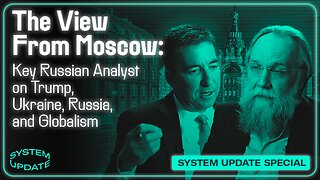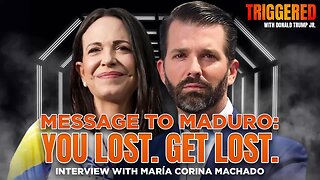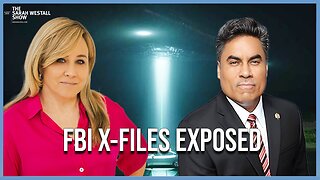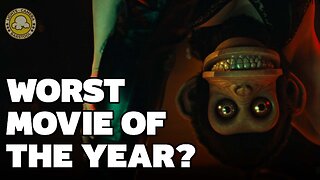Premium Only Content

Licensing Liberty: Reclaiming Constitutional Rights from Government Overreach
In recent decades, the proliferation of state-mandated licenses for activities such as fishing, hunting, driving, and boating has sparked a growing debate about the balance between government regulation and individual liberty. Many citizens are beginning to question the legitimacy of these licensing requirements, arguing that they infringe upon constitutionally protected rights. This article delves deep into the legal, historical, and philosophical arguments against state-imposed licensing, offering invaluable insights and supporting evidence to challenge the status quo.
### **I. The Legal Foundation: Rights vs. Privileges**
At the heart of the debate over licensing is the distinction between a *right* and a *privilege*. Rights are inherent and unalienable, granted by virtue of being human, and are protected by the Constitution. Privileges, on the other hand, are granted by the state and can be regulated or revoked. The crux of the argument against licensing is that the state has improperly converted fundamental rights into privileges, thereby infringing upon individual liberties.
#### **1.1 Murdock v. Pennsylvania (1943)**
In the landmark case of *Murdock v. Pennsylvania*, the U.S. Supreme Court ruled that "no state shall convert a liberty into a license, and charge a fee therefore." This decision emphasized that the government cannot impose a financial burden on the exercise of constitutional rights. The case involved Jehovah's Witnesses who were required to purchase a license to distribute religious literature. The Court found this requirement unconstitutional, stating that it effectively placed a price tag on the exercise of a fundamental right—freedom of religion.
This principle can be extended to other areas where the state imposes licensing requirements on activities that arguably fall within the realm of constitutional rights. For instance, the right to travel, the right to bear arms, and the right to engage in lawful recreational activities like fishing and hunting could all be seen as liberties that should not be converted into state-regulated privileges.
#### **1.2 Shuttlesworth v. City of Birmingham, Alabama (1965)**
The case of *Shuttlesworth v. City of Birmingham* further solidified the principle that when the state attempts to convert a right into a privilege, citizens have the right to ignore the license and engage in the activity with impunity. This case involved civil rights activist Reverend Fred Shuttlesworth, who was arrested for leading a peaceful march without a permit. The Supreme Court ruled in his favor, stating that a citizen could not be penalized for exercising a constitutional right, even if it meant ignoring a state-imposed licensing requirement.
These rulings underscore a critical point: if a license is required to exercise a right, and that license can be denied or revoked, then the right has been effectively reduced to a privilege.
### **II. Historical Context: The Expansion of State Power**
The rise of licensing requirements can be traced back to the increasing expansion of state power over the 20th century. Initially, licenses were introduced as a means of regulating certain activities for public safety or resource management. However, over time, the scope of licensing has expanded to cover a wide range of activities that were once considered basic rights or freedoms.
#### **2.1 The Right to Travel**
Historically, the right to travel freely was recognized as a fundamental liberty, essential to the exercise of other rights. The requirement for a driver's license, however, has turned this right into a state-regulated privilege. While the state justifies driver's licenses as a means of ensuring public safety on the roads, critics argue that this regulation infringes upon the fundamental right to travel, as recognized in cases such as *Kent v. Dulles* (1958), where the Supreme Court asserted that "the right to travel is a part of the 'liberty' of which the citizen cannot be deprived without the due process of law."
#### **2.2 The Right to Bear Arms**
The Second Amendment to the U.S. Constitution protects the right to bear arms, yet many states require citizens to obtain a license to carry firearms, whether openly or concealed. This licensing requirement effectively converts a constitutional right into a state-regulated privilege, raising significant concerns about government overreach. While proponents argue that licensing is necessary to prevent gun violence, opponents contend that it infringes upon a right that is explicitly protected by the Constitution.
#### **2.3 The Right to Hunt and Fish**
Hunting and fishing have long been considered traditional rights, deeply rooted in American history and culture. However, the imposition of hunting and fishing licenses by the state has turned these activities into regulated privileges. Originally, such licenses were introduced as a means of conservation, to protect wildlife populations and ensure sustainable practices. Yet, the requirement to obtain a license, coupled with fees, restricts access to these activities and raises questions about the state's role in regulating what many consider to be natural rights.
### **III. The Philosophical Argument: Natural Rights and Government Overreach**
The philosophical underpinnings of the argument against licensing are grounded in the concept of natural rights, which hold that certain freedoms are inherent to all individuals and cannot be legitimately restricted by the government. This perspective is rooted in the writings of Enlightenment thinkers such as John Locke and Jean-Jacques Rousseau, who argued that the role of government is to protect natural rights, not to grant or restrict them.
#### **3.1 The Social Contract and the Limits of Government Authority**
According to social contract theory, individuals consent to form a government to protect their natural rights, but this government must operate within certain limits. When the state begins to convert rights into privileges, it oversteps its bounds and violates the social contract. The imposition of licenses for activities that were once considered basic rights is seen as an encroachment on individual liberty and a misuse of government authority.
#### **3.2 The Slippery Slope of Licensing**
Licensing requirements, once accepted, can lead to a gradual erosion of rights. What begins as a regulation intended for public safety or resource management can expand into a broader system of control, where the government has the power to dictate who can and cannot exercise certain freedoms. This slippery slope is a central concern for those who oppose licensing, as it represents a potential threat to the very foundation of a free society.
### **IV. Corroborating Evidence: A Global Perspective**
Licensing requirements are not unique to the United States; they are a global phenomenon. However, the extent to which they are imposed, and the public's response to them, varies widely across different cultures and legal systems.
#### **4.1 International Comparisons**
In some countries, such as Switzerland, gun ownership is widespread, and licensing is minimal, reflecting a cultural emphasis on individual responsibility and trust in citizens' ability to manage their own affairs. In contrast, other countries, like Australia and the United Kingdom, have stringent licensing requirements for firearms, justified by a desire to prevent gun violence but also sparking debate over the balance between safety and liberty.
Similarly, the right to travel is recognized differently across the world. In many European countries, driver's licenses are seen as a basic requirement for road safety, but the process of obtaining one is often more rigorous than in the United States, reflecting a different approach to balancing individual freedom with collective responsibility.
#### **4.2 Case Studies: The Impact of Licensing on Liberty**
Several case studies illustrate the impact of licensing on individual liberty. In the United States, the controversy over fishing and hunting licenses in rural communities highlights the tension between conservation efforts and traditional rights. Many argue that licensing fees disproportionately affect low-income individuals, effectively restricting their access to natural resources that were once freely available.
Another example is the growing movement against driver's licenses among certain libertarian and sovereign citizen groups, who argue that the right to travel should not be subject to government approval. These groups often cite constitutional arguments and historical precedents to support their refusal to comply with licensing requirements.
### **V. The Path Forward: Reclaiming Liberty**
The debate over licensing is far from settled, but it is clear that a growing number of citizens are questioning the legitimacy of state-imposed licenses for activities that were once considered basic rights. To reclaim these liberties, a multifaceted approach is necessary.
#### **5.1 Legal Challenges**
One potential avenue for change is through the courts. As demonstrated by cases like *Murdock v. Pennsylvania* and *Shuttlesworth v. City of Birmingham*, the judiciary can play a crucial role in protecting individual rights from government overreach. Citizens who believe that their rights have been infringed by licensing requirements can challenge these laws in court, using constitutional arguments and legal precedents to make their case.
#### **5.2 Legislative Reform**
Another approach is through legislative reform. Advocates for liberty can work to change laws that impose unnecessary licensing requirements, lobbying for the repeal or modification of regulations that convert rights into privileges. This can be done at the local, state, or federal level, depending on the specific licensing issue in question.
#### **5.3 Public Awareness and Education**
Finally, raising public awareness about the issue of licensing is essential. Many people comply with licensing requirements simply because they are unaware of the constitutional implications or the historical context of these laws. By educating the public about their rights and the dangers of government overreach, advocates can build a broader movement to reclaim individual liberty.
### **Conclusion: A Call to Action**
Licensing requirements for activities such as fishing, hunting, driving, and boating represent a significant and growing concern for those who value individual liberty. The conversion of rights into privileges by the state is not only a legal and constitutional issue but also a philosophical and ethical one. As citizens, it is our responsibility to question these regulations, to challenge them when necessary, and to work toward a society where liberty is respected and protected.
The cases of *Murdock v. Pennsylvania* and *Shuttlesworth v. City of Birmingham* provide powerful legal precedents that can be used to resist the imposition of licenses on activities that should be considered fundamental
-
 7:28
7:28
FragmentsOfTruth
1 day agoAre We Just Batteries? The Gnostic Horror of Human Existence
1413 -
 2:00:20
2:00:20
Glenn Greenwald
11 hours agoThe View from Moscow: Key Russian Analyst Aleksandr Dugin on Trump, Ukraine, Russia, and Globalism | SYSTEM UPDATE #414
101K43 -
 1:10:55
1:10:55
Donald Trump Jr.
8 hours agoBREAKING NEWS: My Father Revokes Biden-Maduro Oil License, LIVE with Maria Corina Machado | Triggered Ep.220
174K187 -
 1:25:29
1:25:29
Sarah Westall
7 hours agoX-Files True History, Project Blue Beam, Cabal Faction War w/ Former FBI Agent John DeSouza
71.3K11 -
 7:03:49
7:03:49
Dr Disrespect
14 hours ago🔴LIVE - DR DISRESPECT - NEW PC VS. DELTA FORCE - MAX SETTINGS
153K26 -
 49:04
49:04
Lights, Camera, Barstool
1 day agoIs The Monkey The Worst Movie Of The Year?? + Amazon Gets Bond
62.3K4 -
 24:19
24:19
Adam Carolla
1 day agoDiddy’s Legal Drama Escalates, Smuggler Caught Hiding WHAT? + Philly Eagles & The White House #news
105K17 -
 10:12
10:12
Mike Rowe
2 days agoClint Hill: What A Man. What A Life. | The Way I Heard It with Mike Rowe
113K16 -
 1:31:52
1:31:52
Redacted News
9 hours agoBOMBSHELL! This is war! FBI whistleblowers reveal Epstein files being destroyed? | Redacted News
184K379 -
 48:55
48:55
Candace Show Podcast
10 hours agoSTOP EVERYTHING. They FINALLY Mentioned ME In The Blake Lively Lawsuit! | Candace Ep 152
154K128